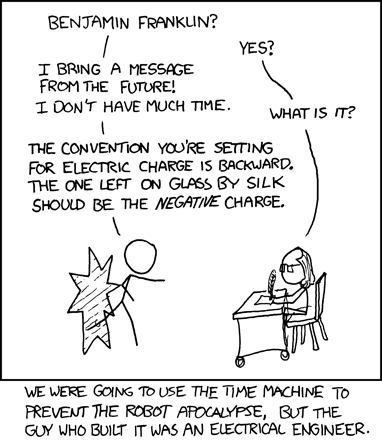I usually keep religion and politics out of these posts, since learning more about science, math, and engineering can benefit anyone, no matter what his or her political beliefs. However, on occasion, it is important to point out logical fallacies — especially when those espousing the fallacies are running for President — and should know better. Recently, Ben Carson, a neurosurgeon and Republican candidate for President, stated that he believed Darwin got the idea for Natural Selection from Satan.
This is NOT how science works, Mr. Carson. (You’ve given up your right to be called Doctor, in my opinion.) Science works by considering the evidence. It doesn’t matter — at all — what result you want to see. What matters is what results you actually get — and what evidence is actually there, waiting to be measured and quantified.
To explain this difference, and why it matters, I offer a cautionary tale in traditional religious / folk-knowlege anecdotal form. Here, then, is The Parable of the Thermostat.
The Parable of the Thermostat
Once, there were two identical houses, built side by side. Each was constructed in the same manner, from the same materials.
These houses were bought by a Scientist and a Mystic, respectively.
One day, the weather became cooler. The Scientist consulted her thermometer. “It is getting colder out,” she noted. “The temperature in my house is too cold. I shall build a Thermostat to automatically measure the temperature and connect it to a Furnace, so my house remains comfortable this winter. If my house becomes cold, the Thermostat will sense this and cause the Furnace to correct it.”
So the Scientist did just this. She created a Thermostat from an Arduino and a DS18B20 temperature sensor.
At first, the new Thermostat caused a few problems. First, the relay would not fire, due to too low a coil voltage. Then, a programming glitch caused the whole house to become quite warm.
The Mystic, visiting his friend, chuckled. “God provides for me, friend Scientist. I have no need of your theories and Scientific Method. See, my house is quite comfortable.”
The Scientist agreed. “Yes, the temperature in your house is perfect. But that’s because it’s early October. You really should consider making a Thermostat, so that when your house becomes cold, it will turn on your Furnace, and make you warm.”
As she spoke, the Scientist continued to refine the thermostat’s design. With a reasonable two-degree-C hysteresis setting and a new drive transistor, the thermostat was soon working well and keeping the house nice and comfortable.
Her job done, the Scientist went next door to the Mystic’s house, to offer advice on how he could also build a thermostat. (The Scientist didn’t always understand the Mystic, but loved his stories and the stained glass and ever-present smell of incense, which made his house a peaceful place.) Making a second Thermostat would now be easy, thanks to the Scientist’s efforts in documenting what did and did not work when building the first one.
“I do not need a thermostat,” the Mystic answered. “God provides for His children. My house is warm and comfortable, since I have built it as my Book of Lore says.”
The Scientist, noting that she could see her breath, was inclined to disagree. “It does seem chilly in here.”
“Ah, yes,” the Mystic replied. “This is clearly a test of my faith. This house is warm. I need no thermometer or furnace. God will provide,” he explained through slightly chattering teeth.
The Scientist shrugged. “Well, if you should change your mind, I will be happy to help.”
…
And so it was. While the Mystic was able to bundle up and survive the winter (he never did explain the sudden need for blankets in a “warm” house), he was mysteriously ill for much of the winter season. The Scientist, meanwhile, remained comfortable while collecting more data to improve the thermostat’s functionality.
The moral of this tale? Even the wiser religious leaders agree that we must look out for ourselves if we are to thrive — or even survive. Science provides us the power to greatly improve our lives and the lives of others, if we are willing to listen to reason. Science is simply a collection of noting what works and what doesn’t, under various circumstances, and then creating and most importantly, testing hypotheses about how the world works. If a hypothesis doesn’t correctly predict real-world results, it is incorrect — no matter how beautiful it may be and no matter how ancient the text that suggests it.
Mr. Carson: Please start acting like the intelligent MD you supposedly are, rather than an agent of the Spanish Inquisition. You’re embarrassing yourself. Nobody in his or her right mind would question that thermostats work. They work because the science behind them works. Evolution is the same. It really works. It really happened. If your religious views are not compatible with this, then they are wrong.


